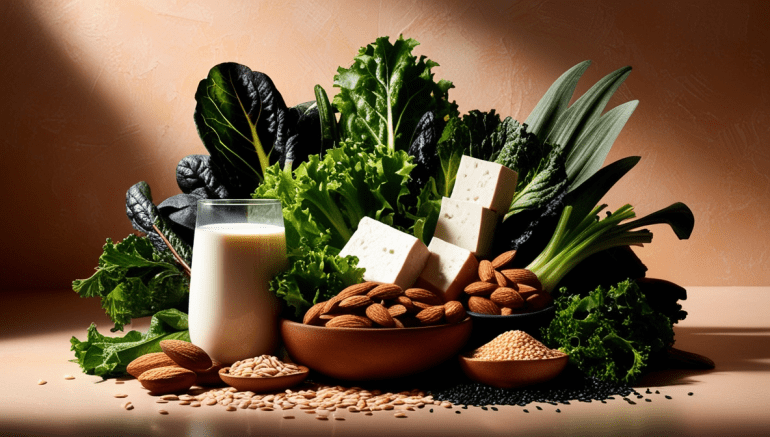Calcium is essential for maintaining strong bones, supporting muscle function, and ensuring your heart and nerves work effectively. While dairy products are the traditional go-to for calcium, plant-based diets can easily meet your calcium needs with a variety of nutrient-rich foods. Here’s a guide to the best vegan sources of calcium, how much you need, and tips for maximizing your calcium intake.
How Much Calcium Do You Need?
The recommended daily intake (RDI) of calcium varies based on age, gender, and life stage. For most adults, 1,000 mg per day is recommended, while older adults and teenagers may require up to 1,200-1,300 mg. Getting sufficient calcium from your diet is essential to support bone density and prevent osteoporosis.
1. Leafy Green Vegetables
- Top choices: Kale, collard greens, bok choy, and turnip greens.
- Calcium content: A single cup of cooked collard greens contains around 270 mg of calcium, which is over 25% of the daily recommended intake.
- Tip: Some leafy greens, like spinach, contain oxalates, which can bind calcium and reduce absorption. Opt for low-oxalate greens like kale and collard greens to maximize calcium intake.
2. Fortified Plant-Based Milks
- Top choices: Almond milk, soy milk, and oat milk.
- Calcium content: Most fortified plant-based milks contain about 300 mg of calcium per cup, comparable to cow’s milk.
- Tip: Shake the carton before pouring, as calcium may settle at the bottom. Fortified plant milks are an excellent way to get a reliable calcium source if you consume them daily.
3. Tofu and Tempeh
- Calcium-set tofu: Tofu made with calcium sulfate has a calcium content of up to 350 mg per 3.5-ounce serving.
- Tempeh: A fermented soy product that provides around 100 mg of calcium per cup.
- Tip: Tofu and tempeh are versatile; they can be added to stir-fries, salads, and sandwiches for an extra calcium boost.
4. Nuts and Seeds
- Top choices: Chia seeds, sesame seeds, almonds, and tahini (sesame paste).
- Calcium content: A single tablespoon of chia seeds provides 80 mg of calcium, and two tablespoons of tahini offer 130 mg.
- Tip: Sprinkle chia seeds or tahini in smoothies, salads, and oatmeal. Almonds are also a great snack, providing about 75 mg of calcium per ounce (about 22 almonds).
5. Beans and Lentils
- Top choices: White beans, navy beans, and chickpeas.
- Calcium content: A cup of cooked white beans provides approximately 160 mg of calcium.
- Tip: Beans are excellent for soups, salads, and as a base for vegan dips like hummus. They’re high in fiber and other essential minerals, making them a great addition to any meal.
6. Seaweed
- Top choices: Wakame, nori, and kelp.
- Calcium content: One cup of raw wakame seaweed provides about 150 mg of calcium.
- Tip: Add seaweed to salads, soups, and sushi rolls for a calcium boost along with iodine, an essential mineral for thyroid function.
7. Figs and Oranges
- Calcium content: Five dried figs offer around 135 mg of calcium, and one medium orange provides about 60 mg.
- Tip: Figs make a great snack, and oranges are easy to add to salads, smoothies, or to enjoy on their own.
8. Fortified Foods
- Top choices: Fortified cereals, orange juice, and tofu.
- Calcium content: Fortified foods vary, but some cereals offer 100-200 mg per serving, while fortified orange juice contains about 350 mg per cup.
- Tip: Look for cereals and juices that are specifically labeled as calcium-fortified. These can help you reach your daily calcium goals more easily.
Enhancing Calcium Absorption
Getting enough calcium is only part of the equation – absorption is equally important. Here are a few tips:
- Vitamin D: Vitamin D is crucial for calcium absorption, so ensure you get enough sun exposure or consider a vitamin D supplement.
- Limit Excess Sodium: High sodium intake can increase calcium loss through urine. Avoid excess processed foods and opt for whole foods to manage sodium intake.
- Pair with Vitamin K and Magnesium: Both vitamins work synergistically with calcium to promote bone health. Leafy greens, nuts, and seeds are excellent sources of magnesium and vitamin K.
Meeting Your Calcium Needs on a Vegan Diet
With a diverse range of calcium-rich plant foods available, meeting your daily calcium needs on a vegan diet is entirely achievable. By including a variety of leafy greens, fortified products, nuts, seeds, and legumes, you can enjoy a healthy, balanced diet that supports your bones and overall wellness. So, enjoy exploring these plant-based sources and build meals that benefit your bones and body!

